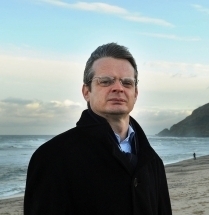
Enda Delaney is a Professor at the University of Edinburgh, where he holds a Personal Chair in Modern History. He studies modernity in comparative historical contexts, with particular interests in modern Ireland and the diaspora since 1750. Some other topics of interest are the history of human cognition and culture, and the “deep” history of the Anthropocene, which extends beyond the traditional boundaries of the discipline to include the pre-history of humans.
Some of his publications include The Great Irish Famine: A History in Four Lives (Gill and Macmillan, 2014); The Irish in Post-war Britain (Oxford University Press, 2007); and the edited volume with Fearghal McGarry, The Irish Revolution 1919 -21: A Global History (Wordwell, 2019). Professor Delaney was Co-Principal Investigator on the recently completed UK Arts and Humanities Research Council-funded project, A Global History of the Irish Revolution, 1916-1923, which has produced a range of publications.
He was invited by Notre Dame’s Cushwa Center for the Study of American Catholicism to deliver this year’s Hibernian Lecture, to be held 9 September, 4:30 on the topic: “Faith and Fatherland: Belief and the Irish Catholic Experience.”
Professor Delaney has had many associations—both virtual and live—with the Keough-Naughton Institute. For the initiative called “the Global Irish Network,” he organized and hosted a webinar in October 2021 on “History, Storytelling and the 1916 Rising – In Conversation with Cilian Fennell.” He was a guest speaker at the Institute’s graduate IRISH seminar (held virtually) in 2021.
In person, Professor Delaney was last at Notre Dame in the spring of 2018, when he was a panelist for the National Endowment for the Humanities lecture of Dr. José Brownrigg-Gleeson Martínez on the Irish and the independence of Latin America at the beginning of the 19th century.
From Edinburgh, he answers our “Three Questions”:
What are you working on?
I'm just putting the final touches to a book called Making Ireland Modern, which explores the Irish encounter with modernity after 1780. I've also started work on a challenging new project on the history of human cognition from antiquity till the present day. While this work on cognition comes out of my Irish history background, this is a completely new line of research for me, taking in different places over the long stretch of human history.
What are you reading?
I'm enjoying The Dawn of Everything: A New History of Humanity (2021) by the late David Graeber and David Wengrow, a fascinating and refreshing new look at the history of humans. I admire the intellectual ambition of this book as well as the authors’ iconoclastic approach—and their superb writing.
What are you most looking forward to this coming academic year?
I'm returning to teaching this academic year after a long period of sabbatical leave, so it will be wonderful to be back teaching, especially as we will be face-to-face. Our students here at Edinburgh are very talented and engage creatively with the complexities of studying Irish history. A particular bonus will be having on-campus events again, as our Irish history group has an exciting program of activities planned.